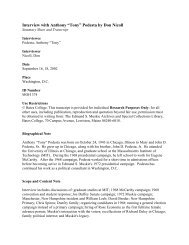Interview with Eliot Cutler by Andrea L'Hommedieu - Bates College ...
Interview with Eliot Cutler by Andrea L'Hommedieu - Bates College ...
Interview with Eliot Cutler by Andrea L'Hommedieu - Bates College ...
You also want an ePaper? Increase the reach of your titles
YUMPU automatically turns print PDFs into web optimized ePapers that Google loves.
how to write, which not only gave me an advantage from the get go in college, but really led to,<br />
as much as anything, led to my career. I mean, my career has in one shape or form been built on<br />
writing more than on anything else, and on my ability to write and to write well. So that was<br />
certainly the most important thing that happened to me at Deerfield, and I'm not at all sure it<br />
would have happened that way or that early at Bangor High School.<br />
AL: And where did you attend college?<br />
EC: Harvard <strong>College</strong>.<br />
AL: And law school?<br />
EC: Georgetown in Washington. I never really attended law school, I mean I have a degree<br />
from Georgetown. That's part of the whole Muskie story, but I went to Harvard <strong>College</strong>. I<br />
believe to this day that I got into Harvard almost entirely <strong>by</strong> virtue of the efforts made on my<br />
behalf <strong>by</strong> Frank L. Boyden, who was the headmaster of Deerfield. A fellow who had been<br />
headmaster of Deerfield, when he retired in 1964 [sic 1968], for sixty-two [sic sixty-six] years<br />
and, you know, was the last of the great headmasters of the great New England prep schools. He<br />
was, when he came to Deerfield in 1902, it was a little town grammar school, public grammar<br />
school, and he transformed it into what it is today, or into what it was when he left and it became<br />
what it is today. And he had developed relationships <strong>with</strong> a lot of admissions officers. In those<br />
days it was certainly less competitive than it is today, but it was still competitive. And I was an<br />
underachiever, even at Deerfield. But he thought I, he saw something in me and took me under<br />
his wing. And Deerfield was a very interventionist place, I mean they, you were, there were no<br />
girls, there was no social life, it was, you know, you wore a coat and tie every day to class. It<br />
was regimented, that's how we'd describe it today I think. But it was a great experience and it<br />
was a terrific place to grow up. My mother didn't always think so, my mother hated Deerfield<br />
for all of those reasons, and it certainly went against her grain.<br />
AL: That it didn't allow women.<br />
EC: It didn't, no, not at all, but I mean there were other, there were girl's schools and there<br />
were boy's schools in those days, and there were almost no coed boarding schools, if any. No,<br />
that wasn't what rubbed her the wrong way, what rubbed her the wrong way was that it was<br />
conservative, Republican, regimented, everything that went against her grain.<br />
And there was one incident at Deerfield which I will never forget, nor will she. The number two<br />
guy at Deerfield, sort of the deputy headmaster, was a fellow named Bob Merriam who was<br />
about as tall as you, strong as an ox, short hair, tough, like a Marine. Not a Marine, but sort of a,<br />
he was the soccer coach and the hockey coach, and he was, you know, the enforcer. Frank Boyd<br />
never really got his hands dirty <strong>with</strong> the enforcement of the rules, Merriam did. Well, Merriam<br />
was a very direct guy.<br />
And sometime, I think it was early in my, yeah, it had to be sort of the end of the first term of my<br />
junior year. I'd gone through my sophomore year, I'd done all right, not great, I'd obviously, you<br />
know, I was okay but I was, you know, I was getting D's. I'd made the debate team I think <strong>by</strong>



